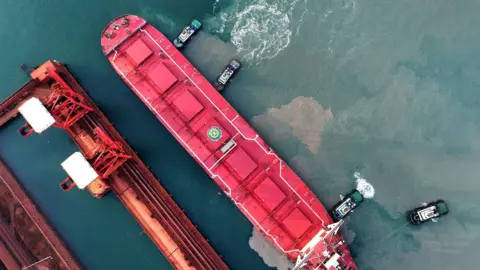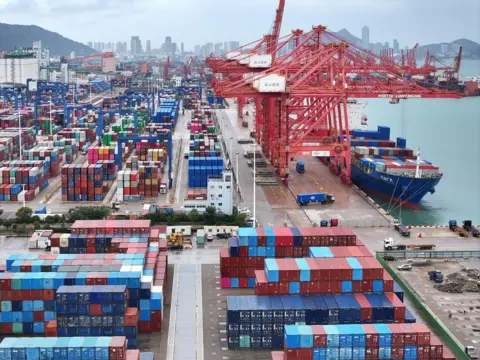Global breakthrough agreement to tackle shipping emissions
April 11, 2025
Global breakthrough to tackle shipping emissions
 Costfoto/NurPhoto/Getty Images
Costfoto/NurPhoto/Getty ImagesCountries have agreed a global deal to tackle shipping emissions, after nearly ten years of negotiations.
The agreement covers the vast majority of the world’s commercial shipping and means that starting in 2028, ship owners will have to use increasingly cleaner fuels or face fines.
The deal was nearly derailed after Saudi Arabia forced a last minute vote and the US pulled out of talks in London – but it eventually passed on Friday.
Small island states and environmental groups were angry that a blanket tax was not agreed to and called the deal “unfit for purpose”.
Shipping accounts for around 3% of global emissions. But unlike many other sectors it has struggled to reduce its carbon footprint over the last decade and is reliant on fossil fuels like diesel.
But the agreement means it is now the first industry in the world with internationally mandated targets to reduce emissions.
The agreement was passed at the UN’s International Maritime Organisation (IMO) meeting.
It will require owners of large international vessels to increase their use of less carbon intensive fuels or face a penalty of up to $380 per tonne of carbon dioxide emissions they emit from burning fuel.
Although the final agreement was passed, it had to be put to a vote – an unusual move for UN bodies that usually agree measures by consensus.
The vote was requested by Saudi Arabia, who did not support the agreement, and this position was shared by a dozen other oil-producing nations, including Russia.
Although they opposed the proposal, they will be bound to implement it because they are members of the IMO.
There have been moves to improve the efficiency of ships, but emissions have continued to increase in line with global trade – 90% of which is carried by ships.
The most effective measure would be to switch ships away from fossil fuels to green fuels, but that would be very expensive.
“There is no fuel as cheap as diesel that ships use today because when we take crude oil out of the ground, we take out all the nice bits, that’s the kerosene for aviation, diesel and petrol for cars,” said Faig Abbasov, programme director for maritime transport at think tank Transport and Environment.
“Whatever is left at the bottom, that’s what ships burn. So no fuel will be as cheap as this because not much energy goes into its production,” he said.
In comparison, the most environmentally friendly fuels like e-kerosene and ammonia are created from initially splitting water atoms to obtain hydrogen, which is a very energy-intensive and costly process.
Figures vary depending on the fuel type but the World Economic Forum estimates that these green fuels are 3-4 times more expensive to produce.
“There’s still a huge cost gap between the fossil fuels and the zero emission fuels and we need to close this gap. So you need carrots and sticks and in shipping the stick is not that big yet to use sustainable fuels,” said Refke Gunnewijk, program manager for sustainable transport at the Port of Rotterdam.
 Reuters
ReutersSome island states also abstained and said the deal was a watered down version of what they hoped for. An earlier proposal to apply a blanket carbon tax or levy – which would have been a world first – was dropped.
“Let us be clear about who has abandoned 1.5°C. Saudi Arabia, the US and fossil fuel allies pushed down the numbers to an untenable level and blocked progress at every turn,” said Ralph Regenvanu, minister of energy and climate change for Vanuatu.
Their disappointment was shared by environmental groups.
“This week, IMO member states squandered a golden opportunity for the global shipping sector to show the world how it can turn the tide on catastrophic climate heating, putting their own goals out of reach”, said Delaine McCullough, president of the Clean Shipping Coalition.
It is estimated that the agreement could achieve an 8% reduction in emissions for the sector by 2030, according to the maritime consultancy UMAS. This would be short of the IMO’s target agreed two years ago to cut emissions by 20% by the end of the decade.
But China and Brazil had previously raised concerns that a levy could result in a significant price increase for basic goods like food. Both countries backed the final deal.
Jesse Fahnestock, director of decarbonisation at the Global Maritime Forum, said that the deal was a compromise.
“It is a difficult set of decisions, but it is the first regulation of its kind and that is to be celebrated,” he said.
Fahnestock added it was unclear if the penalties were enough to close the cost gap between the fuel types.
“You may have incentivised shipowners to prepare a bit for the future fuels but whether the signal is strong enough to get the billions of dollars of investment into the production facilities for these fuels – I don’t think these regulations will overcome that. I think more will need to be done,” he said.
Any money raised from the penalties will be put into a “Net Zero” fund, with money spent on scaling up greener fuels and supporting developing countries.
It is this “redistribution” that prompted the US delegation to pull out of the talks on Tuesday night. A letter was sent by the US to all countries at the IMO negotiations saying any levy would cause inflation and if it was passed then “reciprocal measures” would be taken.
Although the US move was at odds with its long-held position at the IMO, it was in keeping with President Trump’s push back on climate action seen over the last few months – such as withdrawing the US from the Paris Climate Agreement.
But industry and country delegates appeared unperturbed when speaking to the BBC on Wednesday and continued with negotiations.
The US only flags 178 cargo ships that represent 0.57% of worldwide commercial shipping tonnage. So if it took the decision not to implement the new proposals it is unlikely to make a significant difference to the funds raised.
Now the committee have agreed the measure, it is expected to be formally adopted in October.

Sign up for our Future Earth newsletter to get exclusive insight on the latest climate and environment news from the BBC’s Climate Editor Justin Rowlatt, delivered to your inbox every week. Outside the UK? Sign up to our international newsletter here.
Search
RECENT PRESS RELEASES
Related Post




